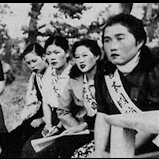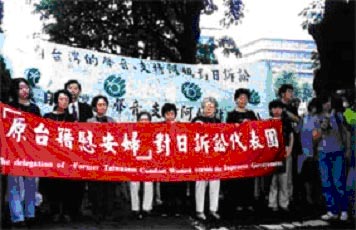|
women and peace |
|||
women and sexual slavery |
 |
||
| On the 60th anniversary of end of war in the Pacific: demands for justice for women victims of Japan's military sexual slavery continue | |||
| As many
as 200,000 girls and young women were forced into military brothels for
the Japanese military during World War II. Demands for acknowledgement,
apologies and reparations for survivors were raised around the world on
the anniversary of Japan's surrender in World War II. On
August 10, 2005, women demonstrated in cities around the world for justice
for the so-called "comfort women." (see news report) Japan's 'comfort women' demand public apology: report from amnesty international ..."A sterile euphemism, the term 'comfort women' belies the brutal humiliation suffered by women condemned to sexual slavery by their Japanese captors from the 1930s to the end of WWII. 'I was taken to China when I was 16 years old and was there for 56 years,' says Lee Ok-sun of Korea, aged 79. She was abducted and taken to Yanbian, northeastern China, where she was forced into sexual slavery in a 'comfort station'." The majority of the women thus victimized were Koreans. Photo right is from the website of the Korean Council for the Women Drafted for Military Sexual Slavery by Japan |
 |
||
|
|||
|
For
background on the issue, a major source is the War Crimes Tribunal that
was held in Tokyo in December 2000: Resources
on the issue are also on the website of Violence
Against Women in War - Network Japan "August 2005
marks the 60th anniversary of the end of WWII. However, for those women
forced into
sexual slavery by the Japanese military between 1932 and 1945, there
has been no escape from the war and no answer for its harm. In South
Korea, the elderly ‘comfort women’ survivors have held demonstrations
in front of the Japanese embassy every Wednesday for 13 years, calling
for justice and reparations for the unanswered war crimes. In support
of these efforts, V-Day has joined with organizations across East and
Southeast Asia to launch the Global V-Day Campaign for Justice to ‘Comfort
Women’. Given the 21st century’s escalating armed conflicts, the precedent
of impunity for wartime sexual violence cannot be tolerated... Among the organizations
active in the Global V-Day: FOKUPERS – Communication
Forum for East Timorese Women (Timor L’Este) works to support
and empower East Timorese women who became victims of violence as a
result of the oppression and occupation of the Indonesian or Japanese
military, including ex-political prisoners, war widows, and the ‘comfort
women’ survivors of the WWII era... |
|||
|
New
Museum Opens in Tokyo on Sexual Slavery during War The idea of the museum came from the well-known Japanese activist Yayori Matsui. This story is told on the website of the organization Violence Against Women in War - Network Japan "formed in 1998 with the conviction that 'in order to eliminate violence against women in war and armed conflicts, women at the global and national levels are seeking to build a non-militarized world by bearing the responsibility of creating a peace that is based on the perspective of women's human rights.' " "Our dear friend, Yayori Matsui passed away on December 27, 2002, at age 68. She was a prominent journalist. She was a hard-core human rights activist and a chairperson of VAWW-NET Japan, Asia-Japan Women's Resource Center. She worked very hard as one of the leading figure to give success to the Women's International War Crimes Tribunal on Japan's Military Sexual Slavery. She even recalled that she gave her life to the Tribunal. Yayori collapsed during her research in Afghanistan in summer 2002, and found out that she had a fatal liver cancer. When she was struggling with pain, the idea of "Women's Museum for War and Peace" flashed into her mind. The museum which has comprehensive information on violence against women in war situations in past and present, and which will be the hub of the women's network for making peace in the world. Following are her ideas of the Museum she left as a last will. Our hope is to realize the Museum through network of women all over the world. We are looking forward to your cooperation..." |
|||

